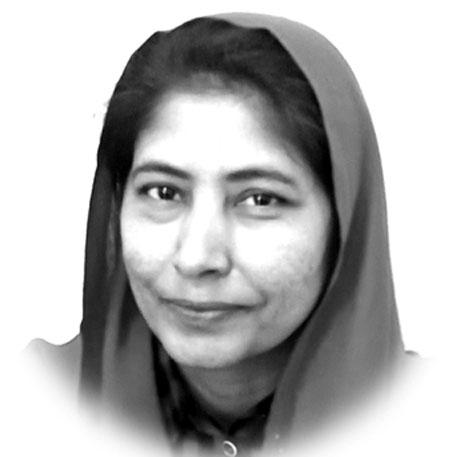Dr Nasreen Akhtar
INDIA’S doctrine of war against Pakistan is not new, neither a surprise for Pakistan. Modi’s unilateral annexation of Jammu and Kashmir on 05 August has exposed his policies against the Kashmiri people; who are living as prisoners in their homeland. The United Nations Security Council (UNSC) has met twice on Kashmir issue in 50 years- and stressed India to resolve a longstanding dispute. China and Russia have not accepted India’s stance, both powers also urged for a peaceful resolution of Kashmir conflict between India and Pakistan. In fact, it is Pakistan’s historic diplomatic success in highlighting the issue. Indeed, the UNSC Kashmir-specific sessions have exposed India’s s hegemonic and expansionist designs of Modi’s government.
India, under Modi, is being known as the fascist and violent state- the way Indian forces are killing Kashmiri people. The second grave issue happens within India, engineered by Modi and his comrades, constitutional amendment which aims to target mainly Muslims. The controversial citizenship law has detonated the whole of India. Hindu extremism has taken place and secularism seems a mirage. Modi and his teams both are under attack by the sane Hindu- politicians, political parties, civil society. On the other hand, Sikh, Hindu are protesting against Mod’s “Citizenship Amendment Bill [law]”. India’s internal chaos has badly exposed India as the largest democracies in the world. To avoid and divert the anti-Modi resentment agitations, in Kashmir and India, Modi and his military’s command have threatened Pakistan.
In his recent statement, Indian Prime Minister, Modi confidently claimed, “Indian forces are now capable of making Pakistan ‘bite the dust’ in less than 10 days”. In the recent past, the Indian Army Chief threatened to invade Azad Kashmir, Pakistan-administered territory. Prime Minister Modi and his military team seem on the same page to initiate war. However, Major General Asif Ghafoor has responded to Modi’s irrational statement that “Pakistan Army will always surprise the Indian armed forces. Major General repeated his statement that “We have said before, and I am saying it again: you may start a war, but we will be the ones to end it”.
An exasperated state always acts offensively without understanding the cost. It is not the Pulwama attack in India-occupied Kashmir which has created a war-like situation between India and Pakistan, it is a constant mindset that never recognized Pakistan as an independent state. India’s war doctrine will, certainly, change the regional and international security order. Indian civil-military establishments have designed anti-Pakistan policy which may ruin the peace of not only, South Asia, it would affect the world also. The world history has unfolded that all powers, in history, sought solid justification of war against their rivals and after the war, they left a toxic legacy which has had grave impacts on people. Look at European history in the past and Afghanistan in the present. The regional states must learn from the previous bloody wars. It seems Modi’s government does not like the ‘peace deal’ between the Taliban and America because Pakistan is playing its key role. India, though, has no power to stop dialogues between the Taliban and America, but it can create an environment that may hurt America’s policy vis-à-vis Afghanistan. Modi government, now, has no control over the chaotic situation in Kashmir and within India. The Indian civil-military leadership has failed in Kashmir and India. Both need honourable passage- so both need a war-like environment.
War is a result of failed internal-external policies or expansionist intent. These factors exist in India. Prime Minister Imran Khan bluntly said in his address “We know it is easy to start a war. It is in the hands of humans to start a war, however, to end the war isn’t in our hands”. It is ironic that India always created the ground for warmongering and its propaganda to isolate Pakistan has become a comprehensive part of its foreign policy. Since Modi assumed power India’s policy is to set intimidation or to undermine Pakistan. Whatever occurred in Jammu and Kashmir, unfortunately, Pakistan was blamed by the Indian civil and military establishments. Increasing attacks on Line of Control (LoC) by the Indian forces and killing of the innocent people have exposed the Indian military malign intentions to provoke the Pakistani army. Modi’s government needs to revisit its anti-Pakistan policy and his war doctrine or else it would lead toward an uncontrolled situation that would upset the regional and global security and political environment.
No doubt, India succeeded to dismember East Pakistan in 1971, but today’s Pakistan is different. The first time in Pakistan’s political history both civil-military establishments have the same chemistry and they are determined to eliminate terrorism and extremism. No country except Pakistan has sacrificed and surfed in the war against terrorism. In his speech to respond to India’s belligerent behaviour, Imran Khan said several times, “We have seen 15 years of terrorism in which 70,000 Pakistanis” including soldiers have lost their lives. Policy to encourage sectarianism and violence may have been considered by the previous regimes but the present government under Prime Minister Imran Khan and the Army Chief, General Bajwa, have a different world view which is for peaceful and cordial relations with neighbouring countries. In fact, this is the Bajwa Doctrine that many times war-like situation has been averted by Pakistan despite the fact Pakistan’s political and military establishments have their people’s support. For the last four years, India is striving to isolate Pakistan; in a modern complex state system, no state can be isolated. Pakistan is an important nuclear state in South Asia and in the Muslim world, how is it possible to isolate a country which has played its pivotal role in the war against terrorism and playing a very pivotal role in international politics?
—The writer is Assistant Professor, IIUI, Islamabad.








